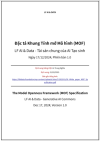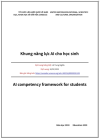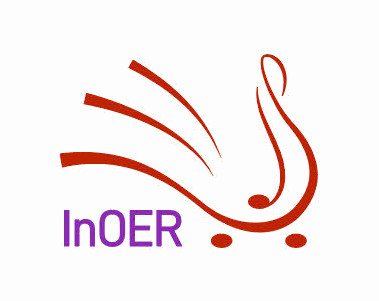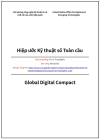Looking Back at SCO: What did it All Mean?
“Lệnh được ban ra rằng Kiến nghị Nối lại Vụ kiện của SCO là một Vấn đề của Luật hoặc, theo Cách giải nghĩa khác, việc có một Vụ kiện Mới đã CHẾT”.
"ORDERED that SCO's Renewed Motion for Judgment as a Matter of Law or, in the Al-ternative, for a New Trial is DENIED."
Theo: http://www.consortiuminfo.org/bulletins/sep10.php#blogx2
Bài được đưa lên Internet ngày: Tháng 09/2010
Lời người dịch: Đây là bài viết của Andrew Updegrove, một luật sư, một chuyên gia và người bảo vệ của thế giới phần mềm tự do nguồn mở (FOSS). Điều này là vô cùng quan trọng đối với toàn bộ thế giới FOSS, chấm dứt cuộc thập tự chinh dường như bất tận - trong vòng 8 năm - của SCO kiện IBM, Novell nhằm mục đích moi tiền hoặc tiêu diệt Linux đã hoàn toàn chấm dứt. Phần thua thuộc về SCO. Từ đây trở đi, sẽ không có ai mè nheo chơi FUD rằng “muốn bị kiện thì đi với FOSS”. Câu này từng dành cho những kẻ cuồng tín chống FOSS, nay chính thức được mang xuống mồ cùng với sự thất bại của SCO.
So ends the ruling of District Judge Ted Stewart. And so also, perhaps, ends the seemingly endless quest of SCO to tax or kill Linux.
Given SCO's well-demonstrated tenacity and unwillingness to face reality, it may seem unwise to assume we have indeed seen the end of the road. But, as with the Black Knight in Monty Python and the Holy Grail, once someone who has lost touch with reality loses their last limb, it's easy to just walk away and leave them alone with their delusions. Presumably, that's what SCO's trustee in bankruptcy will now do, forbidding any funds to be spent pursuing SCO's suit against IBM, or anyone else.
Assuming that's the case, this isn't a bad time to ask the question, "What did it all mean?"
Of course, it meant a lot of things, some of which may not be learned for years to come, either because history will have to show us what the impact of the suits had on the uptake of Linux, or because facts will become public that are not now known (e.g., who may have been supporting, or even directing, SCO's litigation decisions behind the scenes).
But today I think we can identify a number of things that, paradoxically, represent very positive impacts that were certainly never intended by SCO. Here are those that I would say top the list:
1. Best practices for producing open source came of age. Back in 2003, when SCO first started rattling its sabers, there weren't nearly as many open source software, or as many open source projects, as there are today. The SCO suit made everyone, f-rom individual developers up to corporations, more aware of the fact that the creation of code needs to be properly documented in order to avoid future problems. There's nothing like litigation to focus the mind, and minds of all types were indeed focused by the SCO suits. Today, the process of open source projects is much tighter and appropriate, providing a better legal foundation for developers and users alike.
2. The commitment of major corporations to open source was conclusively proven. In 2000, IBM announced that it would dedicate $1 billion in assets to the development of open source software. Open Source Development Labs (OSDL) was formed the same year by IBM and other major corporations. When the SCO suits arose, the litigation provided another visible way in which technology vendors could demonstrate their support for open source software in general, and Linux in particular. Members of OSDL cre-ated a legal defense fund within that organization to defend Linus Torvalds, the principal architect of Linux, and other kernel developers as necessary. That legal defense mission continues today through OSDL's successor, the Linux Foundation, which exists to protect, promote and standardize Linux. The result is that customers know that commercial Linux vendors are solidly committed to supporting not only the commercial development, but also the legal defense, of Linux.
3. The SCO suits provided a rallying point for open source software (OSS) and free and open source software (FOSS) supporters alike to join together to support Linux. It's easy to forget that in 2003 there was a much wider separation between corporations and developers than there is today. Developers worried that the suits would co-opt their code, and corporate managers worried that the independence of developers might make FOSS development unreliable or unstable. That gap could have easily widened. Instead, it has narrowed, as both camps have worked together against a common threat. In the process, each side has gotten to know the other better, and each has become more comfortable in that partnership. This was in no small measure facilitated by the great work performed by Pamela Jones and her contributors at Groklaw, which became the major legal resource for corporations and developers, customers and journalists. PJ made the law understandable and available to the developer community, and the culture of FOSS accessible and understandable to corporate types and journalists.
4. The customer has been both educated and comforted. Free and open source software is new enough that most potential users and commercial customers had little accurate knowledge about it when the SCO suits began. The SCO litigation gave incentives to corporate and law firm lawyers to learn what FOSS/OSS licenses are all about, and also to see the impressive level of effort that the commercial and developer communities will bring to defending them. The law suits also provided incentives to vendors such as Red Hat and Novell to provide the type of warranty protection that reassured customers. And with every loss suffered by SCO, the perceived risk level of using FOSS/OSS continued to fall.
Perversely, SCO's suicidal mission against Linux therefore ultimately served to strengthen the role of the Linux operating system kernel it tried to encumber rather than the opposite. Today, the reality of FOSS/OSS is far stronger than it likely would have been had not SCO destroyed itself in its vain quest.
While it would go too far to thank SCO for what it has done for FOSS/OSS, the saga that hopefully ended yesterday does serve to prove the wisdom once again of that old adage, "Something good comes of all."
Now it's time for FOSS/OSS to move onward and upward, battle-tested, confident and ready for anything.
Dịch tài liệu: Lê Trung Nghĩa
Ý kiến bạn đọc
Những tin mới hơn
Những tin cũ hơn
Blog này được chuyển đổi từ http://blog.yahoo.com/letrungnghia trên Yahoo Blog sang sử dụng NukeViet sau khi Yahoo Blog đóng cửa tại Việt Nam ngày 17/01/2013.Kể từ ngày 07/02/2013, thông tin trên Blog được cập nhật tiếp tục trở lại với sự hỗ trợ kỹ thuật và đặt chỗ hosting của nhóm phát triển...
 DigComp 3.0: Khung năng lực số châu Âu
DigComp 3.0: Khung năng lực số châu Âu
 Các bài toàn văn trong năm 2025
Các bài toàn văn trong năm 2025
 Các bài trình chiếu trong năm 2025
Các bài trình chiếu trong năm 2025
 Các lớp tập huấn thực hành ‘Khai thác tài nguyên giáo dục mở’ tới hết năm 2025
Các lớp tập huấn thực hành ‘Khai thác tài nguyên giáo dục mở’ tới hết năm 2025
 Tập huấn thực hành ‘Khai thác tài nguyên giáo dục mở’ cho giáo viên phổ thông, bao gồm cả giáo viên tiểu học và mầm non tới hết năm 2025
Tập huấn thực hành ‘Khai thác tài nguyên giáo dục mở’ cho giáo viên phổ thông, bao gồm cả giáo viên tiểu học và mầm non tới hết năm 2025
 Các tài liệu dịch sang tiếng Việt tới hết năm 2025
Các tài liệu dịch sang tiếng Việt tới hết năm 2025
 Loạt bài về AI và AI Nguồn Mở: Công cụ AI; Dự án AI Nguồn Mở; LLM Nguồn Mở; Kỹ thuật lời nhắc;
Loạt bài về AI và AI Nguồn Mở: Công cụ AI; Dự án AI Nguồn Mở; LLM Nguồn Mở; Kỹ thuật lời nhắc;
 Tổng hợp các bài của Nhóm các Nhà cấp vốn Nghiên cứu Mở (ORFG) đã được dịch sang tiếng Việt
Tổng hợp các bài của Nhóm các Nhà cấp vốn Nghiên cứu Mở (ORFG) đã được dịch sang tiếng Việt
 Tổng hợp các bài của Liên minh S (cOAlition S) đã được dịch sang tiếng Việt
Tổng hợp các bài của Liên minh S (cOAlition S) đã được dịch sang tiếng Việt
 Năm Khoa học Mở & Chuyển đổi sang Khoa học Mở - Tổng hợp các bài liên quan
Năm Khoa học Mở & Chuyển đổi sang Khoa học Mở - Tổng hợp các bài liên quan
 Bàn về 'Lợi thế của doanh nghiệp Việt là dữ liệu Việt, bài toán Việt' - bài phát biểu của Bộ trưởng Nguyễn Mạnh Hùng ngày 21/08/2025
Bàn về 'Lợi thế của doanh nghiệp Việt là dữ liệu Việt, bài toán Việt' - bài phát biểu của Bộ trưởng Nguyễn Mạnh Hùng ngày 21/08/2025
 Bạn cần biết những gì về các khung năng lực AI mới của UNESCO cho học sinh và giáo viên
Bạn cần biết những gì về các khung năng lực AI mới của UNESCO cho học sinh và giáo viên
 Khung năng lực AI cho giáo viên
Khung năng lực AI cho giáo viên
 ‘Khung năng lực AI cho giáo viên’ - bản dịch sang tiếng Việt
‘Khung năng lực AI cho giáo viên’ - bản dịch sang tiếng Việt
 ‘KHUYẾN NGHỊ VÀ HƯỚNG DẪN TRUY CẬP MỞ KIM CƯƠNG cho các cơ sở, nhà cấp vốn, nhà bảo trợ, nhà tài trợ, và nhà hoạch định chính sách’ - bản dịch sang tiếng Việt
‘KHUYẾN NGHỊ VÀ HƯỚNG DẪN TRUY CẬP MỞ KIM CƯƠNG cho các cơ sở, nhà cấp vốn, nhà bảo trợ, nhà tài trợ, và nhà hoạch định chính sách’ - bản dịch sang tiếng Việt
 50 công cụ AI tốt nhất cho năm 2025 (Đã thử và kiểm nghiệm)
50 công cụ AI tốt nhất cho năm 2025 (Đã thử và kiểm nghiệm)
 ‘Đặc tả Khung Tính mở Mô hình (MOF)’ của LF AI & Data - Tài sản chung của AI Tạo sinh - bản dịch sang tiếng Việt
‘Đặc tả Khung Tính mở Mô hình (MOF)’ của LF AI & Data - Tài sản chung của AI Tạo sinh - bản dịch sang tiếng Việt
 ‘LỘ TRÌNH CỦA TỔNG THƯ KÝ LIÊN HIỆP QUỐC VỀ HỢP TÁC KỸ THUẬT SỐ THÚC ĐẨY HÀNG HÓA CÔNG CỘNG KỸ THUẬT SỐ’ - bản dịch sang tiếng Việt
‘LỘ TRÌNH CỦA TỔNG THƯ KÝ LIÊN HIỆP QUỐC VỀ HỢP TÁC KỸ THUẬT SỐ THÚC ĐẨY HÀNG HÓA CÔNG CỘNG KỸ THUẬT SỐ’ - bản dịch sang tiếng Việt
 “Chúng tôi không có hào nước”: Sự đổi mới đột phá của AI nguồn mở
“Chúng tôi không có hào nước”: Sự đổi mới đột phá của AI nguồn mở
 AI trong TVET - Một vài gợi ý triển khai trong thực tế
AI trong TVET - Một vài gợi ý triển khai trong thực tế
 Dữ liệu để phân loại AI
Dữ liệu để phân loại AI
 Khung năng lực AI cho học sinh
Khung năng lực AI cho học sinh
 Tài sản chung kỹ thuật số và Hàng hóa Công cộng Kỹ thuật số - Tìm thấy nền tảng chung cho các nhà hoạch định chính sách
Tài sản chung kỹ thuật số và Hàng hóa Công cộng Kỹ thuật số - Tìm thấy nền tảng chung cho các nhà hoạch định chính sách
 Tọa đàm ‘Vai trò của Tài nguyên Giáo dục Mở trong chuyển đổi số giáo dục đại học’ tại Viện Chuyển đổi số và Học liệu - Đại học Huế, ngày 12/09/2025
Tọa đàm ‘Vai trò của Tài nguyên Giáo dục Mở trong chuyển đổi số giáo dục đại học’ tại Viện Chuyển đổi số và Học liệu - Đại học Huế, ngày 12/09/2025
 ‘Khung năng lực AI cho học sinh’ - bản dịch sang tiếng Việt
‘Khung năng lực AI cho học sinh’ - bản dịch sang tiếng Việt
 12 dự án AI Nguồn Mở hàng đầu để bổ sung vào kho công nghệ của bạn. 11. Hugging Face Transformers
12 dự án AI Nguồn Mở hàng đầu để bổ sung vào kho công nghệ của bạn. 11. Hugging Face Transformers
 Dự án DIAMAS đưa ra Khuyến nghị và Hướng dẫn Truy cập Mở Kim cương
Dự án DIAMAS đưa ra Khuyến nghị và Hướng dẫn Truy cập Mở Kim cương
 ‘Hiệp ước Kỹ thuật số Toàn cầu’ của Liên hiệp quốc - bản dịch sang tiếng Việt
‘Hiệp ước Kỹ thuật số Toàn cầu’ của Liên hiệp quốc - bản dịch sang tiếng Việt
 ‘Phân loại dữ liệu liên quan đến việc phát triển, sử dụng và giám sát các hệ thống AI (Dữ liệu phân loại AI)’ - bản dịch sang tiếng Việt
‘Phân loại dữ liệu liên quan đến việc phát triển, sử dụng và giám sát các hệ thống AI (Dữ liệu phân loại AI)’ - bản dịch sang tiếng Việt
 50 công cụ AI tốt nhất cho năm 2025 (Đã thử và kiểm nghiệm) - Trợ lý AI tốt nhất (chatbots)
50 công cụ AI tốt nhất cho năm 2025 (Đã thử và kiểm nghiệm) - Trợ lý AI tốt nhất (chatbots)